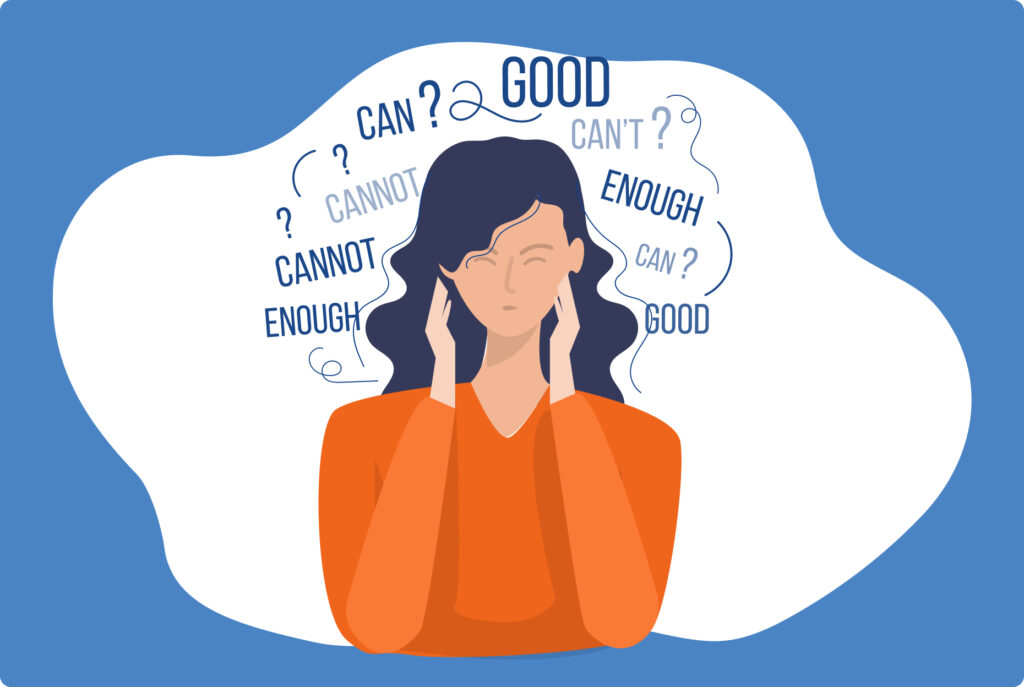


By Beth Levine
Does this scenario resonate with you?
THEM: What a bang-up job you did in the meeting today! So smart the way you handled that.
YOU: Oh, it was just luck that I happened to have that info.
TO YOURSELF: (Wow, dodged another bullet. One of these days they are going to find out how much I actually stink at this.)
Are you positive that any day now your boss is going to realize that you are clueless? When someone compliments you, is your first reaction to dismiss it and explain why it isn’t so? The imposter syndrome — the feeling that you are a fraud or a phony and don’t deserve any praise — is real. It’s like that iconic scene in The Wizard of Oz where the great and powerful Oz is revealed to be a scared little man, hiding behind a curtain.
ADHD Increases the Chance of Feeling Like a Fraud
And you know who suffers a lot from the imposter syndrome? People with ADHD.
“It’s extremely common in the general population but I do believe it’s probably worse for people with ADHD for some very specific reasons,” says Bonnie Mincu, a senior certified ADHD coach working out of Nyack, N.Y., who also has ADHD.
One reason may be that if you have ADHD, you may have been told that you are wrong and deficient. You begin to believe the negativity, making you feel unworthy of compliments or respect — that you are just never enough.
“It doesn’t happen overnight. It takes years of receiving criticism and experiencing judgments for somebody to develop this core sense of deficiency, no matter how accomplished they have become,” says Sharon Saline, Psy.D., author of What Your ADHD Child Wishes You Knew: Working Together to Empower Kids for Success in School and Life. Saline also has ADHD.
This can lead to shame that is way out of proportion, says Mincu.
“Many people with ADHD are predisposed to toxic shame,” she says. “If so, they might make some little mistake, and blow that up into thinking ‘I am totally worthless, I’m stupid, I don’t belong in this job.'”
There Is a Correlation Between ADHD and Rejection Sensitivity
Mincu points out that people with ADHD are more prone to emotional dysregulation or rejection sensitive dysphoria (RSD). With RSD, they may always be looking for signs that people are rejecting, criticizing or judging them.
“If they’re always on the alert for that, and they think they find it, it feeds into that feeling that others will know that they are really a fraud,” she says.
The Imposter Syndrome Usually Doesn’t Exist in a Void
To make it even more difficult, imposter syndrome often comes with other issues and conditions — called co-morbidities — such as depression, anxiety, low self-esteem and social dysfunction, according to a study published in August 2020 in the Journal of Mental Health & Clinical Psychology.
You Are Not a Fraud
You may have those negative thoughts in your head, playing over and over, telling you that “you are not as good as …. ” But you can rewrite the script.
Here are eight steps that can help you do that:
1. Get help
Talk therapy or ADHD coaching — alone or in combination with each other — can help you understand why you are so down on yourself and give you tools for breaking the thought patterns. They can also provide a screen to determine if you have any of other mental health conditions that often come with ADHD and can complicate the issue.
2. Find your people
The Journal of Mental Health & Clinical Psychology study found that people with imposter syndrome tend to think they are the only one with these feelings, pushing them into isolation. For that reason, the researchers recommend group therapy to help normalize the feeling. If that is not possible, find an ADHD community online — a forum or message board where you feel safe to express your feelings and get validation that you are not alone.
3. Identify your triggers
Mincu suggests that every time you have one of those “I’m a fraud; I am unworthy” feelings, note what or who triggered you. Was it a certain situation or a tone of voice or a specific person?
“Instead of just feeling a global overwhelm, you can start to see a pattern,” she says. “It is easier to work on those specific things than just this amorphous feeling of failure.”
What are you feeling at this time? Can you put a name to it? Why this person or this situation?
4. Challenge the voice in your head that undercuts you
That inner critic is probably an amalgam of other voices in the past. Ask yourself whose voices are in there? Teachers? Your parents? The high school mean crowd?
Identify what you are saying to yourself, how it evolved and then come up with counter statement, such as: “I worked every day for two weeks on this project and my boss was very pleased and I got a bonus. I deserve that because of the work that I did. It’s not luck.”
“It’s the attribution of luck to success that is disempowering,” Saline says. “You achieved because you worked for it. You may not work in the same way that neurotypical people do, but the result is the same.”
5. Stop resetting the goalpost
When achieving a set goal, many people with imposter syndrome will just reset their endgame. For example: “So I ran three miles at my personal best. Big deal, my sister did it in even better time.”
Then when they hit that second goal, they just up the ante further to reestablish the fact that they are a fraud. It’s what Saline refers to as “compare and despair.”
What to do? When you hit one goal, quiet your mind and say: “I did that. I worked hard and I did it.” When your inner critic starts up, say: “Stop!” And pull your mind back to that one moment of acceptance. Stretch the amount of time you can sit with that feeling.
6. Accept a compliment without qualifications
It’s going to feel weird at first. But when someone says something positive about you, catch yourself before you give in to that kneejerk reaction to point out all the ways it isn’t true. Train yourself to say: “Thanks.”
If you just can’t, Saline says you can just admit that you have problems accepting praise. Say something like: “Thank you so much for telling me. Compliments are tough for me, so I’m going to try to take that in.”
7. Challenge and reframe negative thoughts
Pay attention to the small things that are working.
“When we do smaller things that we can actually take responsibility for and acknowledge, it’s easier for our systems to digest and hold on to,” Saline says. “For example, following through on something you say you’re going to do counters that critic that you’re a fraud, because you’re acting with integrity.”
8. Most of all, practice mindful self-compassion
What the imposter syndrome is often about is that you have no self-compassion. Practicing positive mantras may sound corny but it does help: “I worked hard, I deserve this.”
“If you wouldn’t say what you are saying to yourself to a third grader with a skinned knee, then don’t say it to yourself,” Saline says.
You can do it. As the Dalai Lama once said: “Be kind whenever possible. It is always possible.” And that should start with yourself.





